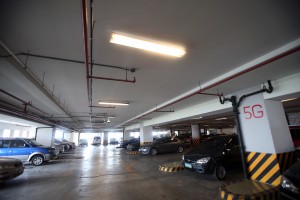
One of the parking areas of the Makati City Hall Building II. INQUIRER FILE PHOTO / NIÑO JESUS ORBETA
MANILA, Philippines–The Anti-Money Laundering Council (AMLC) is following the Senate blue ribbon subcommittee inquiry into the alleged overpricing of the Makati City Hall Building II and is gathering information on possible violations of the law.
Julia Bacay-Abad, executive director of the AMLC secretariat, told the subcommittee on Wednesday that the council was keeping tabs on the proceedings.
“We’re of course collating any relevant information that we get from these hearings, which we can probably use in performing our functions, specifically investigating possible money laundering offenses in relation to any unlawful activity or predicate crimes that may have been committed,” she said.
Abad explained that two types of transactions are reported to the AMLC.
One is covered transactions, or those in excess of P500,000 regardless of the type of transaction. The other is suspicious transactions, which may involve amounts lower than P500,000 but trigger red flags.
Sen. Alan Peter Cayetano asked Abad to disclose in general terms what the AMLC was doing to assure the public that the council was on top of the matter.
Late action
Cayetano said there had been instances where people investigated by the Senate had already withdrawn the contents of their bank accounts by the time cases were filed in court.
That, he said, is the reason why the AMLC has been asking for stronger powers, including the power to freeze bank accounts.
Cayetano also said that while business transactions did not necessarily raise suspicions, these would take on a different complexion if there was related testimony that the business had been used as a front for graft and corruption, or as dummies for politicians who could not explain their wealth.
Improve COA rules
Members of the subcommittee also called for an improvement in Commission on Audit (COA) rules and procedures, after noting that auditors appeared to have missed certain questionable things about the parking building.
Sen. Antonio Trillanes IV said he hoped the COA auditor who had missed questionable costs related to the building should face administrative cases.
The initial COA audit of the P2.28-billion building had no adverse findings. But the COA is now conducting a special audit of the building, and its initial study has found several red flags, especially the undue haste in the implementation of the project.
Stumbling blocks
Sen. Aquilino Pimentel III, chair of the blue ribbon subcommittee, said that if the panel found overpricing in the construction of the building, the finding would clash with the findings of the COA team that audited the building.
And that could mean that things slipped past the technical audit specialists, he said.
He said his goal was to improve audit procedures.
“We can’t always resort to a special audit,” he said.
COA technical officer Roldan Menciano explained the difficulties auditors faced after Sen. Aquilino Pimentel III asked whether the COA officials went into details in scrutinizing the building and saw the P974,000 price for the sign “Makati City Hall Building II” alone.
Menciano said auditors faced stumbling blocks in making a detailed study because under COA guidelines, they must base their assessment on the agency’s cost data. But he also noted that the agency’s price evaluation division no longer existed.
He also said the COA could get information from the Construction Industry Authority of the Philippines, but the organization had prices of common construction materials only. Auditors also have difficulty in canvassing for prices because suppliers don’t always cooperate when they learn that they are dealing with COA employees, he said.
Menciano said he had been involved in the special audit of the pork barrel and Malampaya funds, as well as of the modernization program of the military. He followed the same procedures, he said.
Auditors’ dilemma
Trillanes said Menciano should have at the very least noted red flags.
“You’re dealing with public funds… P1 million was just for the [sign] alone,” Trillanes said, adding that he hoped an administrative case would be brought against the COA personnel who audited the building.
Testifying at the inquiry last week, COA Commissioner Heidi Mendoza said auditors faced the risk of either being co-opted by those they were investigating or being harassed for doing their jobs.
Exert all efforts vs overprice
Trillanes proposed that resident auditors be done away with and the task of auditing agencies be raffled off to auditors. This way, the agencies would not be able to scare or bribe auditors, he said.
COA Commissioner Jose Fabia said audit personnel must exert all efforts, “especially if they see there is an obvious overprice.”
“We also admit there are matters that need to be addressed on the commission with respect to improving our work,” Fabia said.
As for the abolition of the price evaluation division, he said it happened under a previous administration, but added he was looking into the matter.
Cayetano said auditors could have checked other sources of information, such as the construction cost handbook used in private projects.
DTI help
To deal with the matter of uncooperative private suppliers, he said the COA could tap the help of the Department of Trade and Industry (DTI). These suppliers could be threatened with the revocation of their permits, he said.
“I can’t accept that the government is helpless,” Cayetano said.
But he added that there was also a need to strengthen the laws to improve the auditing of government transactions.